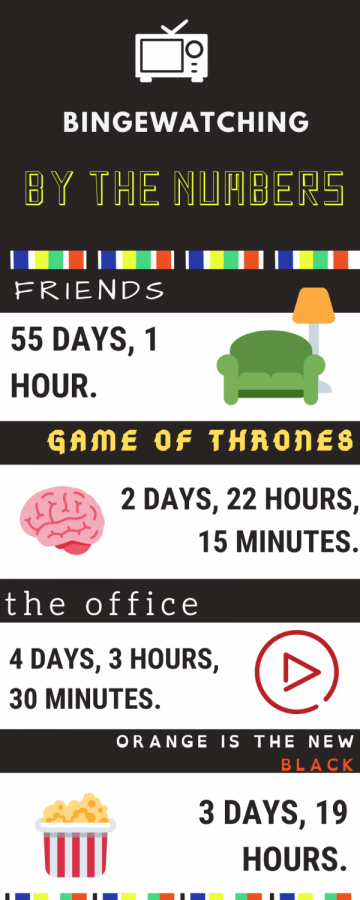Are You Still Watching?
Students weigh in on how binge watching effects sleep
Bingeclock.com provides statistics showing how long it would take to watch T.V. shows in one sitting.
It’s Friday night. Hot Cheetos on deck, tucked under a blanket, junior Julia Marku settles in for a binge. A few miles away, a similar scene unfolds as junior Annie Joseph sets down a basket with piles of laundry and gets to folding.
As many people have started making the transition from watching mainstream T.V. to using streaming services, a new culture surrounding entertainment has emerged.
Marku enjoys indulging and watching multiple episodes of her favorite shows at a time, especially when a season is newly released.
“My favorite show is ‘Orange is the New Black,’ and when that came out I watched it all in one day,” she said.
Joseph also tends to binge-watch shows when she finds something she really likes.
“I was watching a show, it was during winter break, and I watched pretty much like seven seasons in a week,” she said.
A HuffPost article published in 2017 titled “The Netflix Addiction: Why Our Brains Keep Telling Us to Press Play,” broke down the science behind why many people often find it hard to stop watching and get back to real life.
The article mentions a hormone called Corticotropin-Releasing Hormone, which is produced when a person is watching a cliffhanger and feels the stress of the uncertainty.
“This [CRH] causes the body to remain alert (our fight or flight response), which can disrupt sleep,” the article said. “So, when you’re faced with that cliffhanger at midnight, you’re suddenly not so tired and you find yourself pushing through the next show.”
Netflix CEO Reed Hastings also admitted to the role sleep plays in the business.
“We’re competing with sleep, on the margin,” Hastings said.
Joseph found Hasting’s admission unsettling.
“You can’t really compete against something that’s a human function,” she said.
Senior Pallavi Chigurupati, who prefers YouTube to any kind of streaming service believes the responsibility lies somewhere in the middle.
“I think it’s equally theirs [Netflix’s] and equally personal responsibility,” she said.
Marku, on the other hand, believes it is within Netflix’s rights as a company to operate the way it does.
“If they want to make the big bucks they should go for it, and it’s up to the person to get their sleep,” Marku said.
Both Marku and Joseph also agree that finishing a series in a short amount of time is something to take pride in. In fact, both of them offered similar statements in relation to how they feel after finishing a series:
“I feel accomplished,” Joseph said.
Marku, after pointing out that she never feels guilty either, eventually reached the same conclusion.
“I don’t feel guilty, usually I’m just sad that I finished a show and now I have to find another one,” Marku said.
Your donation will support the student journalists of Troy High School - MI. Your contribution will allow us to print our work, purchase equipment and cover our annual website hosting costs.


